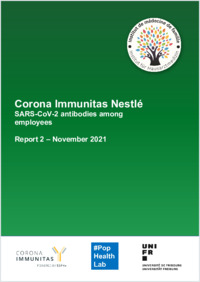Corona Immunitas Nestlé: SARS-CoV-2 antibodies among employees : Report 2 - 2021
DOKPE
- Schmid, Alexia University of Fribourg
- Dubois, Julie University of Fribourg
- Piccardi, Nathalie Nestlé Research
- Anker, Daniela University of Fribourg
- Cullati, Stéphane University of Fribourg
- Chiolero, Arnaud University of Fribourg
- Rodondi, Pierre-Yves University of Fribourg
- Fribourg : Institut de médecine de famille (IMF), Université de Fribourg, 2021
English
Corona Immunitas Nestlé is a longitudinal study conducted among employees at two Swiss sites of the Nestlé company, i.e., Nestlé Research in the canton of Vaud and Nespresso factory Romont in the canton of Fribourg. The main objective of the study was to estimate the proportion of employees who have developed antibodies against SARS-CoV-2. The study has been initiated by the Institute of Family Medicine (IMF) and the Population Health Laboratory (#PopHealthLab) of the University of Fribourg within the framework of the national Corona Immunitas research program of the Swiss School of Public Health (SSPH+). The baseline part of the study, described in the first Corona Immunitas Nestlé report, took place between December 2020 and February 2021, and was conducted among 425 employees. At the time of the decline of the second epidemic wave until February 2021, 15% of the employees, both sites combined, had developed anti-spike IgG antibodies against the virus. The same percentage was observed among employees working on Nestlé Research sites or at the Nespresso factory in Romont. This report describes the results of the longitudinal follow-up part of the study aiming at estimating again the proportion of employees who have developed antibodies following an infection or vaccination until July 2021. The second study visits took place between May 26, 2021, and July 27, 2021. A total of 284 (67%) participants initially included participated in the follow-up part (56% women; age range between 21 and 64 years old with a mean of 43 years). Participants completed a questionnaire and took a blood test to measure anti-spike IgG antibodies against SARS-CoV-2. The proportion of individuals with anti-spike IgG antibodies, both work sites combined, was 73% (95% confidence interval (CI) 68% to 78%). The proportion was 83% (95% CI 78% to 88%) among employees working on Nestlé Research sites (Lausanne area) and 42% (95% CI 31% to 54%) among those working at the Nespresso factory in Romont. Sixty-eight percent of the participants reported having received at least one dose of the vaccine at the time of the blood test (79% on Nestlé Research sites; 34% at Nespresso factory in Romont). Among the 48 participants who had already developed antibodies at baseline, 3 of them (6%) were negative at follow-up. These results are close to the observations made in the general population, with the proportion among Nestlé Research employees being slightly higher than the average prevalence of the cantons that collected samples until July 2021. Participants reported a moderate impact of the implemented measures on their wellbeing, except for the requirement to wear a mask, which appeared to be constraining. Conducting a seroprevalence study within a company helps understanding the situation in the workplace, i.e. to estimate antibody levels and the extent of vaccination among employees, which could help to adapt implemented measures.
- Faculty
- Faculté des sciences et de médecine
- Department
- Master en médecine
- Language
-
- English
- Classification
- Pathology, clinical medicine
- License
- Identifiers
- Persistent URL
- https://folia.unifr.ch/unifr/documents/313184
Statistics
Document views: 124
File downloads:
- Schmid_Report2: 97
